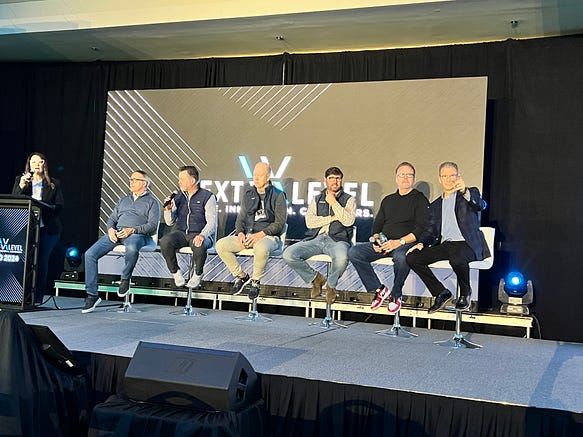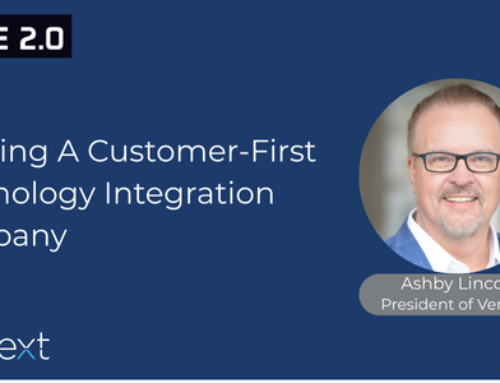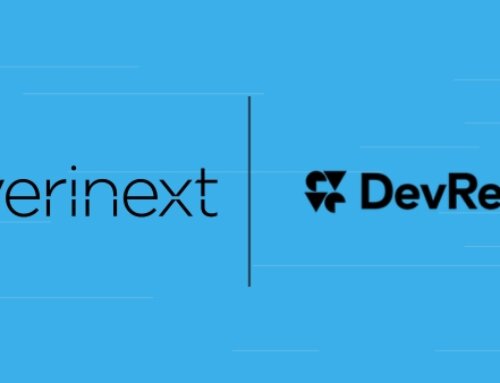Asa part of our series called ‘Five Things I Wish Someone Told Me Before I Became A CEO’ we had the pleasure of interviewing Brian Glahn.
Verinext CEO Brian Glahn has more than 25 years of executive leadership and operating experience in technology and M&A. He previously served as CEO of Anexinet prior to its merger with Veristor in 2022 to create Verinext. Brian has also held executive leadership and board positions with Presidio, Service Point, CXtec and Atlantix Global Systems.
Thank you so much for joining us in this interview series! Before we dig in, our readers would like to get to know you a bit more. Can you tell us a bit about your “backstory”? What led you to this particular career path?
Istarted in sales — right out of college, I landed an inside sales role at a local tech reseller in Atlanta. I wasn’t thinking about a career path at the time; I just told my dad, who was in tech himself, that I wanted to make as much money as possible. He helped line up a few interviews, and I ended up calling one hiring manager twice a day for nearly a month until I got the job. Persistence paid off.
From there, I gradually expanded my scope — building and leading sales and engineering teams, then moving into operations, finance, and IT. That well-rounded exposure gave me a strong foundation and a natural runway to becoming a CEO. Over the years, I’ve had the opportunity to lead multiple companies, including one that we successfully sold just 18 months after launching.
Verinext represents the culmination of all those experiences — leading a business that brings together technology, people, and performance.
Can you share the most interesting story that happened to you since you began leading your company?
One that always makes me laugh happened right here in our office. I typically wear a sport coat every day, but one morning I showed up in a golf shirt. Our front desk receptionist, who I see and chat with daily, looked at me and said, “I didn’t know you had arms!” She was genuinely surprised — she had never seen me in anything but a jacket. It was such a simple comment, but it made my day and reminded me how much presence and perception matter in leadership, even in small, funny ways.
Can you share a story about the funniest mistake you made when you were first starting? Can you tell us what lesson you learned from that?
Early on, I made the mistake of moving too fast with decisions — hiring too quickly, changing course before we fully understood the impact. On the flip side, I’ve also moved too slow when I should have acted faster. It’s easy to underestimate how important timing and discipline are in leadership. I’ve learned to be much more thoughtful about balancing urgency with process — and most importantly, about listening before acting.
None of us are able to achieve success without some help along the way. Is there a particular person who you are grateful towards who helped get you to where you are? Can you share a story about that?
My father, Ted Glahn without a doubt. He was a CEO in tech and the best mentor I’ve ever had. Growing up, I watched how he led with strength, compassion, and a deep understanding of people. He showed me that leadership isn’t about control — it’s about accountability, care, and respect. His influence shaped me as both a professional and a person.
Leadership often entails making difficult decisions or hard choices between two apparently good paths. Can you share a story with us about a hard decision or choice you had to make as a leader?
The hardest decisions are always the ones that affect people directly. Whether it’s deciding to exit a service line or letting someone go, those choices impact families, not just roles. There was one case where I had to make a very difficult personnel decision to preserve the integrity and performance of a broader team. The individual asked, “Why not make other cuts instead?” And I told them, “Those roles aren’t where the core challenge is.” I’ve learned that often the rest of the team already knows when a change is necessary — they’re just waiting for you to step up. Being respectful and transparent in those moments is crucial.
Ok, thank you for that. Let’s now jump to the primary focus of our interview. Most of our readers — in fact, most people — think they have a pretty good idea of what a CEO or executive does. But in just a few words can you explain what an executive does that is different from the responsibilities of the other leaders?
Other executives often focus deeply on their specific functions — whether it’s sales, operations, IT. As CEO, I have to constantly zoom out and see the full picture. Every decision I make must account for how it impacts every part of the business: IT, finance, operations, HR, customers, culture — you name it. I have to connect the dots between all those functions, ensure alignment, and keep the organization moving toward the top two or three priorities at any given time. It’s about orchestrating — not just managing.
What are the “myths” that you would like to dispel about being a CEO or executive? Can you explain what you mean?
That it’s glamorous. It’s not. People often think being a CEO means you’ve got it easy — travel perks, big decisions, and no heavy lifting. The reality is the opposite. You’re constantly balancing competing demands, dealing with tough issues, and putting out fires. And the deeper you go into leading an organization, the more you realize just how critical it is to stay in the weeds without micromanaging. I even had to hire an executive assistant not for the status, but because I simply couldn’t keep up with everything on my own and still operate at the level I expect of myself.
What is the most striking difference between your actual job and how you thought the job would be?
I overlooked how much work it would take to modernize and operationalize the business systems. In the Verinext journey, we inherited a lot of legacy infrastructure — outdated CRMs, billing systems, subscription tools, you name it. We had to rebuild the entire backend of the business while still running it. I’d improved systems in past roles but never had to start almost from scratch. We had to build everything from the ground up — designing, automating, and implementing best practices. It was a humbling experience.
Do you think everyone is cut out to be an executive? In your opinion, which specific traits increase the likelihood that a person will be a successful executive and what type of person should avoid aspiring to be an executive? Can you explain what you mean?
Not everyone is wired for it, and that’s OK. The best executives I know are strategic thinkers who can build a tactical plan, delegate it, and then inspect it rigorously. They’re willing to course-correct when something isn’t working — without ego. Flexibility, decisiveness, and accountability are critical. On the flip side, if someone struggles with change, avoids conflict, or can’t prioritize across competing needs, the executive path will be tough. This job isn’t about comfort — it’s about growth.
What advice would you give to other business leaders to help create a fantastic work culture? Can you share a story or an example?
Recognize that culture isn’t created by the CEO — it’s created by the people. My role is to support it, nurture it, and remove barriers that get in the way. Culture also evolves. As teams grow up, start families, and move into new life phases, the things that bonded them early on — happy hours, group outings — may not be as relevant. That’s natural. Don’t fight it. Instead, stay in tune with what people need now and find new ways to bring energy and connection to the workplace. And above all, lead by example. Be the positive presence you want others to reflect.
How have you used your success to make the world a better place?
I’ve always tried to make an impact through coaching and volunteering — especially with kids. For years, I coached numerous sports seasons a year across football, soccer, baseball, basketball and more. Now, I continue to coach a special needs baseball program that’s very close to my heart. My whole family is involved — my wife, daughter, and son all pitch in. I believe if you can make a child’s life brighter, even for a moment, you’re doing something meaningful.

What are your “Five Things I Wish Someone Told Me Before I Became A CEO” and why?
- You’re going to be a CIO, CFO, GC and sales leadership — whether you like it or not.
I never expected to be knee-deep in contracts or tech architecture decisions. But as CEO, you must understand every function well enough to challenge it and guide it. - Sometimes it’s not about saving a role — it’s about saving the team.
Letting someone go is never easy but sometimes making that decision early prevents bigger harm down the road. Most of the time, your team already knows the move needs to happen — they’re just waiting for you to lead. - Process matters more than passion when it comes to scaling.
Passion is what gets things off the ground — it’s the spark. But to grow, especially in a PE-backed environment, you need more than just drive. You need structure. Without solid processes and operational discipline, even the strongest culture and best intentions can only take you so far. It’s the combination of both that builds something scalable and sustainable. - The people are the product. We design the architecture, lead the projects, recommend the right infrastructure, and more. But to do that well, we start by listening — because it’s through listening to our people that we unlock the full potential of their expertise. What we deliver is an experience and innovation of a team that’s spent decades solving complex challenges. Our people are the product — and that’s what truly sets us apart.
- You can’t do it alone. And you shouldn’t try.
You’re part of a team — lean into it. Surround yourself with those who know their craft, listen to them, and value what they bring to the table. That’s how you grow, and that’s how you elevate an entire organization.
You are a person of great influence. If you could inspire a movement that would bring the most amount of good for the greatest number of people, what would that be? You never know what your idea can trigger.
I’d focus on mentorship and development for children, especially those with special needs or who come from tough environments. I’ve seen firsthand how mentorship, sports, and inclusion can change a child’s trajectory. If more people dedicated just a few hours a week to mentoring or coaching kids, we’d build a stronger, more compassionate world.
Can you please give us your favorite “Life Lesson Quote”? Can you share how that was relevant to you in your life?
“Be still and know that I am God.” That’s a verse that has grounded me both spiritually and mentally. When things are chaotic, I remind myself not to make decisions in panic mode. Sometimes, the best move is to pause, reflect, and let clarity come. I also tell my kids, “Make the right choice.” That applies to everything — be constructive, stay positive, and work to be the best version of yourself each day. It takes practice, but it makes a difference.
We are very blessed that some very prominent names in Business, VC funding, Sports, and Entertainment read this column. Is there a person in the world, or in the US with whom you would love to have a private breakfast or lunch with, and why? He or she might just see this if we tag them.
That’s easy — Jesus. I’d have a lot of questions. About grace, about suffering, about purpose. I’ve always believed in using my platform to make a difference, and I can’t think of anyone who exemplified servant leadership more than Him.
Thank you for these fantastic insights. We greatly appreciate the time you spent on this. Read the original article here.






